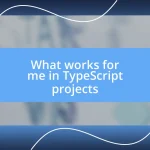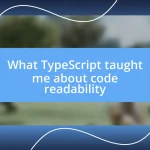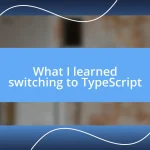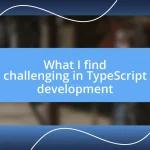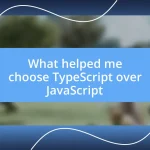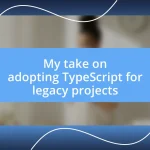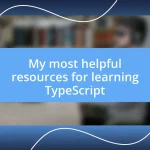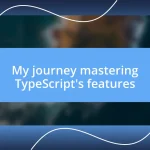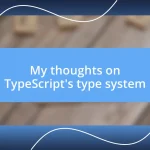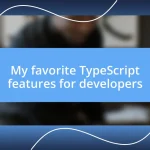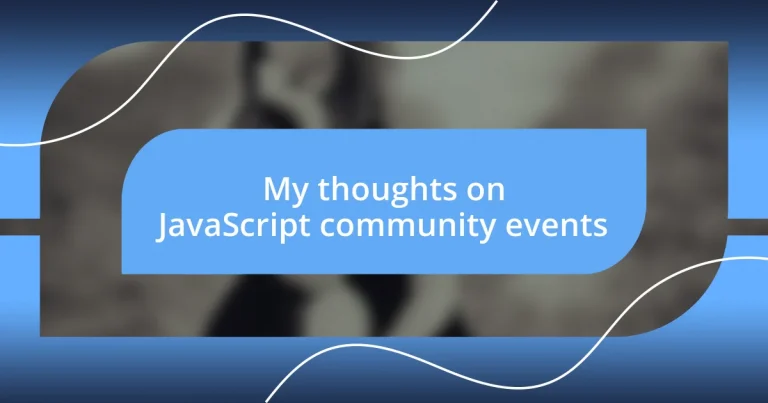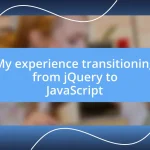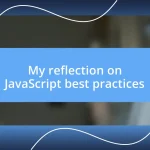Key takeaways:
- JavaScript community events foster collaboration and learning, connecting developers of all skill levels through talks, workshops, and networking opportunities.
- Attending these events leads to invaluable networking, knowledge sharing, and a sense of belonging, enhancing both personal and professional growth.
- Active participation, genuine engagement, and post-event knowledge sharing are crucial strategies for maximizing the benefits gained from community events.
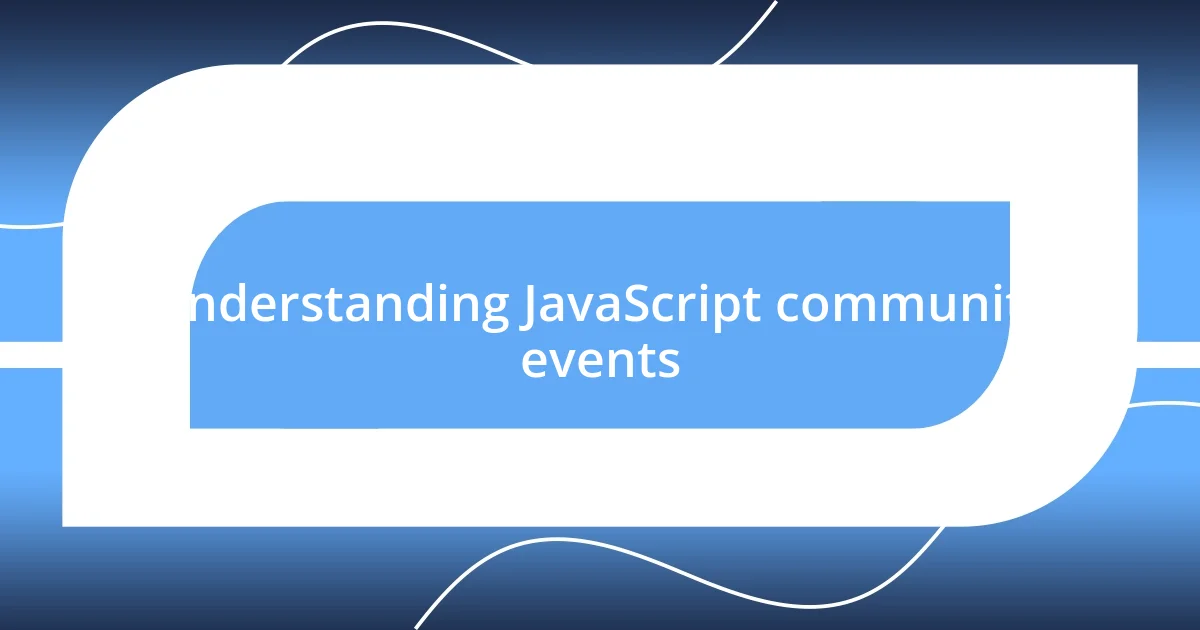
Understanding JavaScript community events
JavaScript community events are vibrant gatherings that foster collaboration and learning in a fast-growing ecosystem. I remember attending my first local JavaScript meetup; it was astonishing how a few shared interests turned into animated discussions about frameworks, libraries, and best practices. Isn’t it amazing how such events can spark inspiration and encourage us to push our coding skills further?
These events often cater to all skill levels, connecting both newcomers and seasoned developers. I’ve found that the blend of talks, workshops, and networking sessions provides a well-rounded experience. Have you ever noticed how engaging with others can bring clarity to your own projects? That’s the beauty of community events—they create an environment where ideas flow freely, leading to unique solutions and partnerships.
Through participation in hackathons and conferences, I’ve experienced firsthand the power of collaboration in the JavaScript community. An unforgettable moment for me was when a fellow developer shared a breakthrough solution to a common problem during a panel discussion. It made me realize how sharing knowledge in these settings elevates everyone’s understanding. Doesn’t it make you feel part of something bigger when you see the community coming together like that?
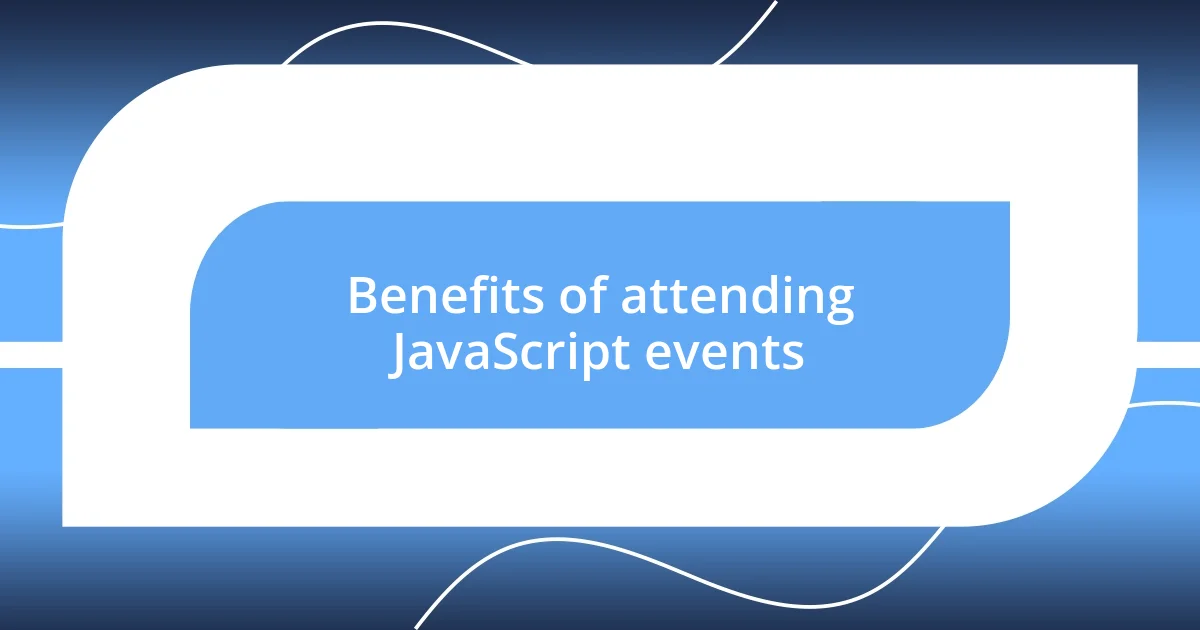
Benefits of attending JavaScript events
Attending JavaScript events offers invaluable networking opportunities that can lead to lasting professional relationships. I recall striking up a conversation with a developer over coffee at a conference, which ultimately led to a project collaboration months later. This chance encounter taught me that the people you meet can significantly impact your career trajectory.
In addition to networking, these events provide a wealth of knowledge through expert talks and hands-on workshops. I’ve attended sessions where industry leaders shared cutting-edge techniques and insights, and I left inspired and armed with practical skills to apply immediately. It’s fascinating how gaining fresh perspectives can reshape your understanding of a familiar topic, isn’t it?
Moreover, participation in community events fosters a sense of belonging and support. I remember feeling an exhilarating rush of camaraderie when my team presented our hackathon project. The encouragement from peers not only boosted our morale but also reinforced my love for the JavaScript community. Events like these can remind you that you are never alone in your coding journey; there’s a tribe out there ready to support you.
| Benefit | Personal Experience |
|---|---|
| Networking | Meeting a developer led to a collaborative project. |
| Knowledge Sharing | Inspired by expert talks and practical skills gained. |
| Sense of Belonging | Thrilled by team support at a hackathon. |
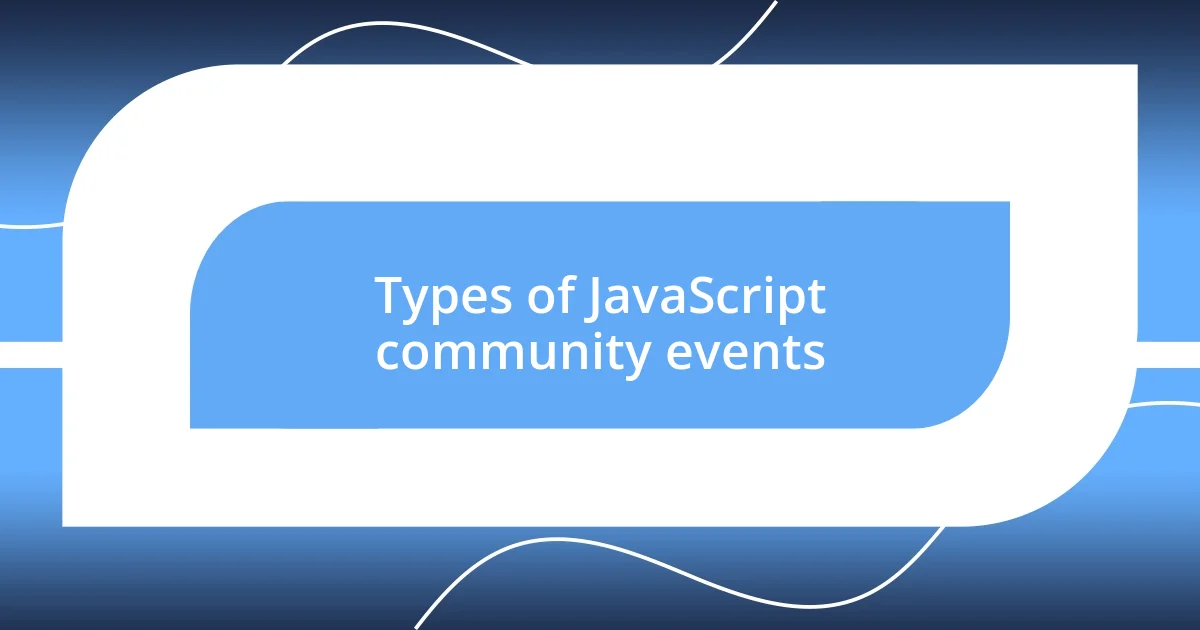
Types of JavaScript community events
JavaScript community events come in various forms, each uniquely valuable. From informal meetups at coffee shops to grand tech conferences, these gatherings play a significant role in our professional development. I remember attending a cozy meetup where we shared our struggles with JavaScript frameworks—a simple activity that turned into a lively discussion helping many of us overcome similar hurdles. It’s incredible what a supportive environment can do for our growth.
Here’s a quick overview of different types of JavaScript community events:
- Meetups: Casual gatherings focused on specific topics within JavaScript, often featuring speakers or open discussions.
- Workshops: Hands-on sessions where attendees can learn and practice new skills, sometimes led by experts in the field.
- Conferences: Larger events that bring together industry leaders to showcase the latest trends, technologies, and best practices.
- Hackathons: Intense coding sessions where teams collaborate to build projects in a short time, often resulting in innovative solutions.
- Webinars: Online events that allow for remote participation, making it easier to connect with the community globally.
Each type carries its distinct flavor, but they all share a common goal: fostering learning and connection. I find that every event offers a fresh aura, filled with potential friendships and partnerships just waiting to be made.
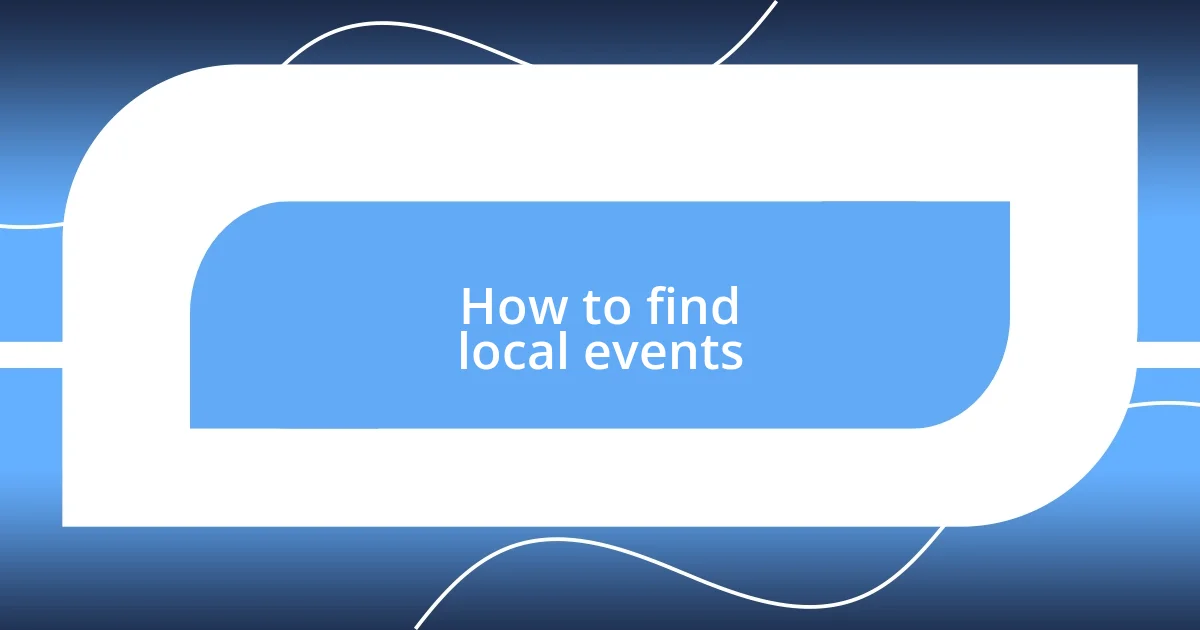
How to find local events
Finding local JavaScript events can be a rewarding adventure. I often use platforms like Meetup and Eventbrite to discover gatherings that pique my interest. These websites allow you to filter events by category and location, which makes it easy to connect with like-minded individuals right in your area. Remember the excitement I felt when I stumbled upon a spontaneous JavaScript jam session in my neighborhood? It’s those unexpected events that often lead to the most delightful conversations and collaborations.
Social media also plays a crucial role in uncovering local events. I’ve found it helpful to follow local tech groups or JavaScript communities on platforms like Twitter and Facebook. Often, members share information about upcoming meetups, workshops, or hackathons that you might not find through traditional means. Just a few weeks ago, I saw a tweet about a coding night at a nearby café, and it turned out to be the perfect opportunity to share knowledge and bond with fellow developers over warm coffee and great discussions. Isn’t it fascinating how social channels can connect strangers based on shared passions?
Lastly, don’t underestimate the power of networking. Engaging with fellow tech enthusiasts at your workplace or local co-working spaces can lead to discovering events that might be just around the corner. I once joined a local coding group simply by conversing with a colleague who was part of it; the connections formed there have been incredibly impactful. What’s your go-to strategy for finding these hidden gems in your community? I would love to hear about your experiences!
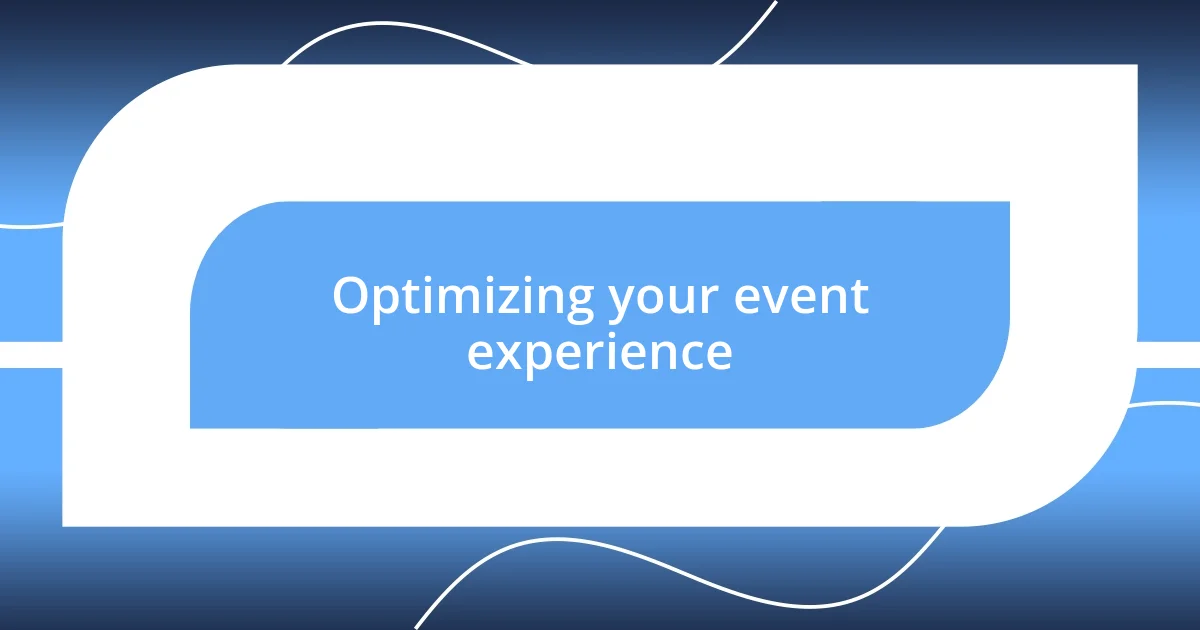
Optimizing your event experience
Optimizing your event experience is all about making the most of the opportunities around you. I’ve learned that arriving a bit early can set the stage for meaningful interactions—sometimes the best conversations happen before the official program kicks off. For instance, I remember getting to a workshop early and chatting with the speaker about their latest project. That conversation not only spurred inspiration for my own work but also led to a valuable mentorship that I hadn’t expected.
Being present at the right moment is crucial, yet preparation is equally important. I’ve often taken notes before attending events about the topics that intrigue me the most. This way, I can engage more deeply during discussions. Have you ever found yourself in a conversation where you felt a bit lost? Having a few questions prepared can help steer the dialogue toward subjects you’re passionate about and allow you to make connections with fellow attendees. I once had a delightful exchange with another developer because I had come prepared to discuss a particular JavaScript library we were both using—it turned into an impromptu brainstorming session that sparked new ideas!
Lastly, I can’t stress enough the value of follow-up. After an event, I make it a habit to connect with people I met, whether through LinkedIn or social media. I once followed up with someone I had met at a conference, leading to collaborative work on a project we both cared about. What a joy it was to transform a fleeting moment into something more substantial! How do you maintain these connections? It’s all about nurturing the seeds we plant during events, turning fleeting interactions into lasting relationships.
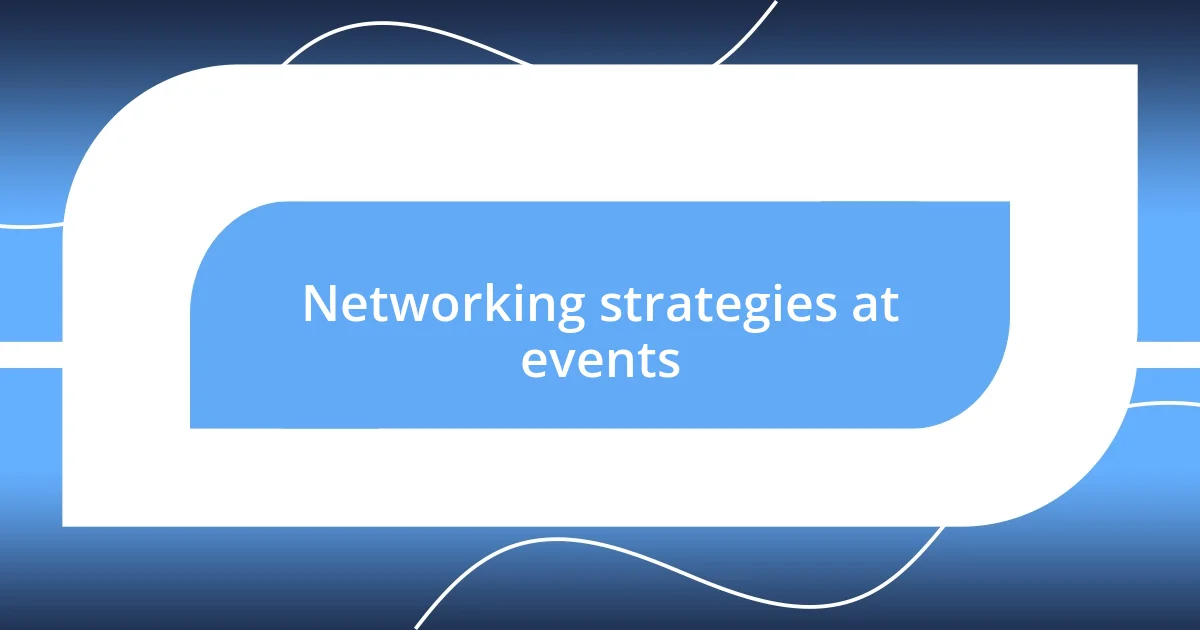
Networking strategies at events
Networking at events can sometimes feel daunting, but I’ve discovered that a genuine approach goes a long way. For instance, I remember attending a local JavaScript meetup where I simply walked up to a small group discussing their favorite frameworks. Rather than worrying about saying something profound, I asked them to share what they were working on. This led to an engaging discussion that not only broke the ice, but also fostered deeper connections. Have you ever just jumped into a conversation without a script? Sometimes, that’s where the magic happens.
Another strategy is to leverage the event’s social channels. I’ve found that engaging with event hashtags on platforms like Twitter creates a virtual space before and after the event. For example, I once interacted with attendees online who later became friends during a lunch break. Seeing familiar faces and exchanging thoughts beforehand helped me feel more at ease when meeting in person. Have you considered using hashtags as an introduction? They can be a fantastic starting point for conversations that might lead to unexpected opportunities.
Lastly, joining activities or workshops within the event can greatly enhance your networking efforts. I vividly recall a coding challenge I participated in during a conference. Not only did it push my skills to the limit, but it also paired me with a valuable contact who had complementary expertise. We ended up collaborating on a project afterward that blossomed from that shared experience. When was the last time you stepped out of your comfort zone? By engaging in the event’s activities, you’re not just networking; you’re truly immersing yourself in the community.
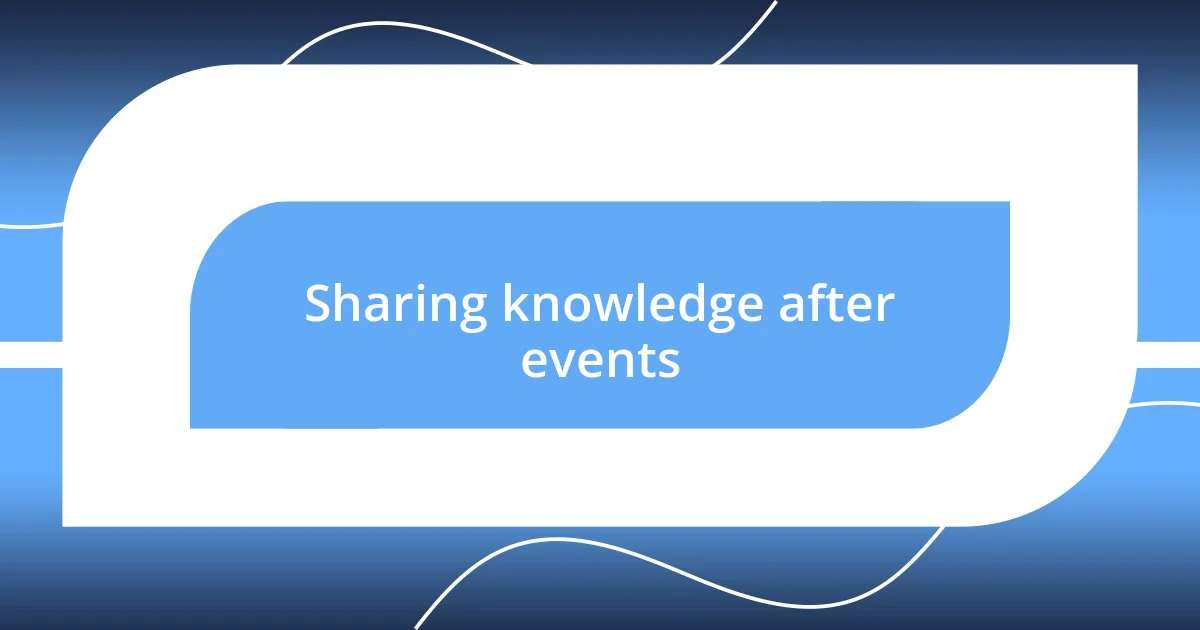
Sharing knowledge after events
After attending an event, I believe sharing knowledge is where the real magic happens. For instance, at the end of a recent JavaScript workshop, I organized a small group chat with some attendees. We pooled our notes and discussed key takeaways. Not only did it solidify our understanding, but I also walked away with fresh perspectives I hadn’t considered before. Have you ever realized how powerful these post-event discussions can be?
I often find that social media plays a crucial role in this knowledge-sharing process. After a conference, I usually make it a point to summarize what I learned and tweet about it using the event hashtag. It’s fascinating to see how people engage with the content, adding their own insights and experiences. I remember getting a reply from a developer I admired, which led to a deeper exchange of ideas. Have you thought about how your posts can resonate with others in the community?
Finally, I’ve had great success in establishing follow-up study groups with fellow attendees. After a recent event, I connected with several developers who were keen to dive deeper into the topics we discussed. We formed a small online group, where we exchanged resources and scheduled regular check-ins. This collaborative effort transformed my initial knowledge into a continuous learning journey. What about you? Could creating a group with like-minded individuals take your understanding to new heights?
